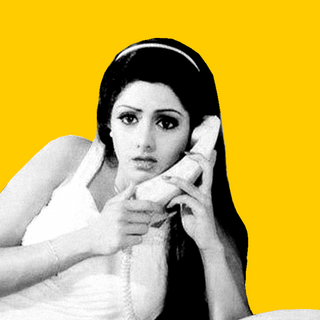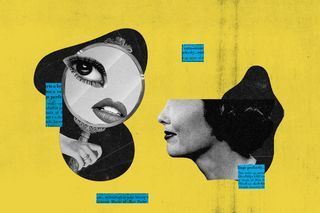
The Feminist Debate: Can Aspiring to Beauty Ever Be Empowering?
Beauty can be a means to share pleasure in feminism rather than pain — but it could also arguably still be rooted in patriarchal oppression.

In Feminist Debates, we pit feminist arguments about power, sex, work, and love against each other — and unpack the grey areas.
Last month, a London-based plastic surgeon named Julian De Siva released his annual list of the most beautiful women in the world — according to “science,” allegedly. His technique includes mapping 12 points on the face, and using the Greek Golden Ratio of Beauty, ‘Phi’ to score them. It’s based on the Greek idea that the human form should conform to a divine mathematical ratio that’s perfect. A list of predictable names made the cut: Zendaya, Bella Hadid, Deepika Padukone, Kim Kardashian, Ariana Grande, among others. But the winner, supposedly, was Jodie Comer — who apparently has a proportional face, and unseated Amber Heard from the position.
That beauty continues to justified this way is bad science. But feminists continue to grapple with it, nonetheless. Plastic surgery, cosmetic procedures, filters, make-up, and skincare are all giant industries that are only getting bigger. And they’re all based on a fundamental, shared premise: there is one way to be beautiful, and it is possible to alter oneself to achieve it. Going through any of these processes, then, is reframed as empowering — it’s a way for women, especially, to take control of their own self-image and have agency over their bodies.
Inevitably, however, the ideal that we aspire to converges into a version of the women on De Silva’s list. And in the pursuit to feel confident in a world designed to undermine it, women often end up circling back to the same oppressive standards that caused the problem, in the first place. Is beauty itself, then, unfeminist? Or can it ever be reclaimed?
There’s no one definition of beauty — it’s what we want it to be.
Beauty used to be a privilege. But over time, it became democratized — with “beauty parlors” and cheap cosmetic products, everyone could control their own appearance in ways that they weren’t able to earlier. This means that beauty norms are constantly evolving — and inclusive. Moreover, many feminists have begun to embrace beauty as a skilled feminine pursuit, and an “evolutionary force.” This means that beauty isn’t an ideal, but a skill — where the “right to be beautiful” is for everyone. In other words, feminism is now post-beauty, where characteristics once left out of beauty — like fatness, darkness — are reclaimed as beautiful.
The flipside: the world still shares an exclusionary understanding of beauty, which affects how we’re treated.
Beauty is still white supremacist and colonialist. Sandra Lee Bartky and Susan Bordo argue that because some women choose feminine beauty independently, it doesn’t contradict its role in perpetuating sexist inequality. Moreover, the exclusionary idea of beauty leads to a phenomenon called pretty privilege, wherein some people are afforded more legitimacy and access just by virtue of their looks. And with beauty remaining racialized and exclusionary, it’s the historically privileged that are afforded the access.
*
There’s nothing inherently wrong with wanting to enhance our appearance — it gives us more control and confidence.
The feminist scholar Kathy Davis, in her treatise on cosmetic surgery, noted how many women who undergo painful procedures, nonetheless, do so as “embodied subjects” — with agency and intention. And they come out of it feeling more in control and confident.
Moreover, some feminists have also arguedthat beauty, and the experience of womanhood itself, tends to be focused on pain. Beauty, as a shared experience, allows the opportunity to find pleasure in the commonalities instead. Some even argue that it offers space for feminist solidarities and sisterhood — based on the shared experience of participating in beauty together.
The flipside: “enhance” inevitably means adhering to a problematic ideal.
Who “considers” us beautiful? Increasingly, social media mediates our understanding of beauty — and it’s homogenizing. Culture critic Jia Tolentino notes how we’re in the age of “Instagram Face” — which is a post-racial amalgamation borrowed from many different cultures. But it inevitably benefits whiteness at the expense of other cultures. The same features that marginalized women were demonized for — plump lips in black women, thick eyebrows in South Asian women, and so on — are aestheticized and celebrated on white faces. This ambiguous era of beauty, then, is inevitably still eurocentric.
*
Beauty standards have changed now — makeup can be used subversively.
Marginalized people have been kept out of beauty for generations — while it was still defined by the privileged. But that’s no longer the case: beauty is constantly in the process of reclamation by the very people it once excluded. “For me, the experience of ugliness was one of self-inflicted pain, self-inflicted punishment, and worthless… After all that, it turns out the people that are the richest with beauty are people who once felt like me,” noted Tom Rasmussen in Dazed. In fact, everything we now deem beautiful, we owe to drag culture. Beauty, then, is queer, subversive, and playful — and insisting on defining it in the traditional way only reinforces an oppressive standard rather than liberates us from it.
The flipside: often, we’re coerced to wear makeup to exist in the world.
Beauty is a construct created to extract profit out of women’s insecurities, and in the process, also creates the insecurities, as feminist Naomi Wolf argued in The Beauty Myth. As a result, beauty remains an imposed expectation for women to occupy space. This, in turn, obliges women to navigate beauty through consumerism — almost creating a beauty “tax” to be deemed professional, credible, and desirable all at once. It’s the ultimate adherence to the status quo — and therefore, to patriarchy itself.
Rohitha Naraharisetty is a Senior Associate Editor at The Swaddle. She writes about the intersection of gender, caste, social movements, and pop culture. She can be found on Instagram at @rohitha_97 or on Twitter at @romimacaronii.
Related


The Buzz Cut: Man Who Messed Around Beginning to Find Out
